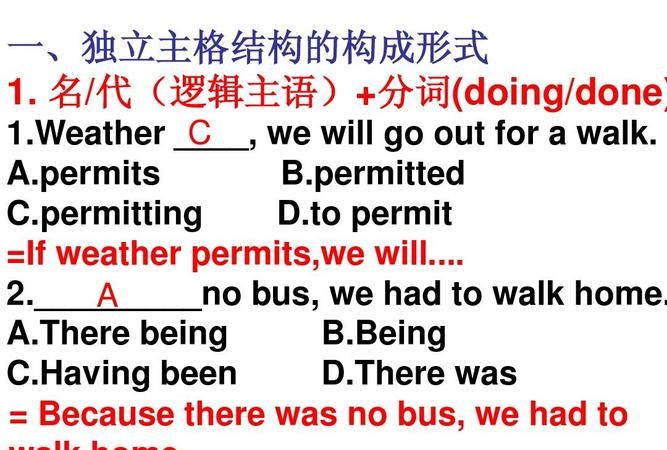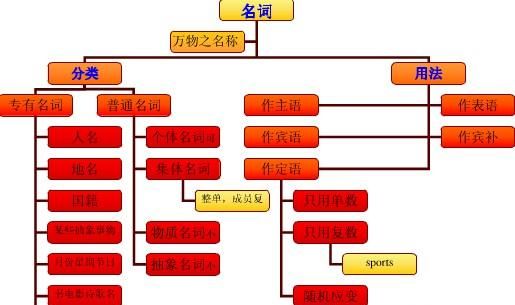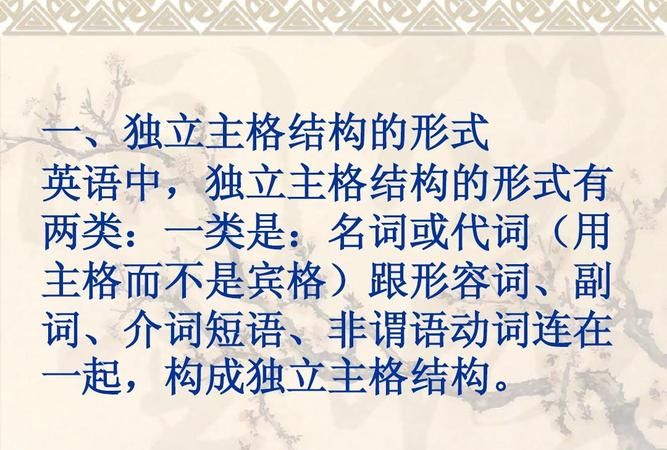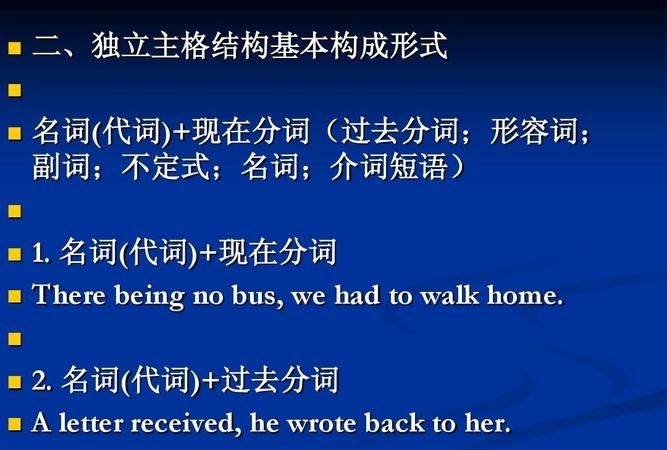本文目录
英语中的独立结构有哪几种形式?怎么用?
不知道你说的是不是英语当中的独立主格结构 如果是的话 那么就应该是下面的情况 下面是我上高中的时候自己总结的笔记 绝对原创
英语中有一种短语结构,在逻辑上他们是主语(n. pron)和谓语(分词、不定式、形容词、副词、介词短语、名词、数词)上的关系,而没有语法意义上的主语和谓语,这种结构叫做独立主格结构。这种结构在句子当中经常起状语的作用,间或作定语。有些可以转换成状语从句,表示原因、时间、方式、条件、伴随等情况。有时前面可以加介词with构成with符合短语。
构成:n./pron+ doing/ done /to do /adj /adv/prep phrase/n./num.
特点:无谓语动词,但前面的n.或pron.与后面的各种短语有逻辑上的主谓关系。
应用:多用于书面语,在描绘性文字中有时用到它来使描绘更生动。
常见类型:
1)n./pron. + 分词 e.g. Spring coming on, the fields turn green. Mother being ill, she had to stay at home. They set out up the mountain, ropes tied to their backs.
2)名词、代词+不定式 e.g. She was left alone, with no one to look after her.
3)名词、代词+形容词 e.g. He entered the room, his nose red with cold. The man looked at the picture, with his mouth open.
4)名词、代词+副词 e.g. He put on his socks, wrong side out. The meeting over, everyone went home. With her mother away from home, she felt lonely.
5)名词、代词+介词短语 e.g. She stood under a tree, hands in her pockets. The girl entered the room, with an apple in her hand.
6)名词、代词+名词 e.g. In the north is Scotland, with its capital Edinburgh.
7)名词、代词+数词 e.g. She has two sons, one six, the other seventeen.
注:无with无须接相应的冠词和人称代词,有with时,需要将相应的冠词和人称代词还原。
e.g. The dog is walking on the bridge, with a piece of meat in its mouth.
The dog is walking on the bridge, with meat in mouth.
位置:
1、表示时间、原因、条件的状语多放在句首,有时可插在句中,可以用相应的状语从句来替代。
e.g. The work done, we felt relieved. (Since the work has been done, we felt relieved.)
They being our friends, we should help them. Weather permitting, we will go there.
2、表示方式、伴随情况的状语放在句尾,有时可以用并列句代替。
e.g. He was deep in silence, his mind working.(方式)
He went to the front door, his sons following him. (伴随)
希望对你有帮助 有问题欢迎随时追问

英语独立结构的3种形式
独立主格结构(Independent Genitive)
独立主格结构有两部分组成,前一部份是名词或者代词,后一部分是非谓语动词或其他的一些词。前后两部分具有逻辑主谓关系。独立主格结构在句中做状语,多用于书面语。
独立主格结构本身不是句子,在句子中作状语,表示时间、原因、条件、伴随等。
独立主格结构的功能
独立主格结构主要用于描绘性文字中,其作用相当于一个状语从句,常用来表示时间、原因、条件、行为方式或伴随情况等。例如: 1) 表示时间 The meeting being over, all of us went home. 开完会后我们都回家了。 Her work done, she sat down for a cup of tea. 她干完了活,坐下来喝茶。 2) 表示条件 The condition being favourable, he may succeed. 若条件有利,他或许能成功。 3) 表示原因 There being no taxis, we had to walk. 没有出租车,我们只好步行。 He wrapped her up with great care, the night being dark and frosty. 夜又黑又冷,所以他把她裹得严严实实的。 4) 表示伴随情况 Almost all metals are good conductors, silver being the best of all. 几乎所有的金属都是良导体,而银则是最好的导体。(=Almost all metals are good conductors, and silver is the best of all.) 常见的独立主格结构有如下几种: 1. 名词/主格代词+现在分词。名词/主格代词与现在分词之间主谓关系。如: The girl staring at him (= As the girl stared at him), he didn”t know what to say. 姑娘两眼望着他,他不知道说什么好。 Time permitting (= If time permits), we will go for an outing tomorrow. 如果时间允许的话,我们明天去郊游。 2. 名词/主格代词+过去分词。名词/主格代词与过去分词之间的动宾关系。如: The problems solved (= As the problems were solved), the quality has been improved. 随着问题的解决,质量已经提高了。 Her glasses broken (= Because her glasses were broken), she couldn”t see the words on the blackboard. 由于眼镜摔坏了,她看不见黑板上的字。 3. 名词/主格代词+不定式。名词/主格代词与不定式之间是主谓关系,且强调的是一次具体性的动作。如: He is going to make a model plane, some old parts to help. 借助于一些旧零件,他要做一个飞机模型。 They said good-bye to each other, one to go home, the other to go to the bookstore. 他们道别后,一个回了家,一个去了书店。 4. 名词/主格代词+形容词。如: An air accident happened to the plane, nobody alive. 那架飞机遭遇了空难,无一人生还。 So many people absent, the meeting had to be called off. 这么多人缺席,会议不得不取消。 5. 名词/主格代词+副词。如: He put on his sweater wrong side out. 他把毛衣穿反了。 The meeting over, they all went home. 会议一结束,他们就都回家了。 6. 名词/主格代词+介词短语。如: The boy goes to the classroom, book in hand. 那男孩手里拿着书去教室。 Mary was sitting near the fire, her back towards the door. 玛丽靠近火炉坐着,背对着门。 7. There being +名词(代词)如: There being nothing else to do, we went home. 没有别的事可做,我们就回家了。 There being no further business, I declare the meeting closed. 没有再要讨论的事了,我宣布散会。 8. It being +名词(代词)如:
It being Christmas, the government offices were closed. 由于圣诞节的缘故,政府机关都休息。 It being a holiday, all the shops were shut. 由于今天是假日,所有商店都关门了。 独立主格结构的特点:
1)独立主格结构的逻辑主语与句子的主语不同,它独立存在。 2)名词或代词与后面的分词,形容词,副词,不定 式,介词等是主谓关系。 3)独立主格结构一般有逗号与主句分开。 举例: The test finished, we began our holiday. = When the test was finished, we began our holiday. 考试结束了,我们开始放假。 The president assassinated, the whole country was in deep sorrow. = After the president was assassinated, the whole country was in deep sorrow. 总统被谋杀了,举国上下沉浸在悲哀之中。 Weather permitting, we are going to visit you tomorrow. 如果天气允许,我们明天去看你。 This done, we went home. 工作完成后,我们才回家。 The meeting gone over, everyone tired to go home earlier. 会议结束后,每个人都想早点回家。 He came into the room, his ears red with cold. 他回到了房子里,耳朵冻坏了。 He came out of the library, a large book under his arm. 他夹着本厚书,走出了图书馆 注:独立主格结构有时可在其前加上介词with。 如:Don’t sleep with the windows open. 别开着窗睡觉。 He was lying on the bed with all his clothes on. 他和衣躺在床上。 She came in with a book in her hand. 她手里拿着一本书走了进来。 He fell asleep with the lamp burning. 他没熄灯就睡着了。 I won’t be able to go on holiday with my mother being ill. 因为妈妈有病,我无法去度假。 He sat there with his eyes closed. 他闭目坐在那儿。 All the afternoon he worked with the door locked. 整个下午他都锁着门在房里工作。 I can’t go out with all these clothes to wash. 要洗这些衣服,我无法出去了。
使用独立主格五点注意: 1.独立主格与状语从句的转换当状语从句的主语与主句的主语不是指同一个对象时,可用独立主格结构取代状语从句,但不再保留连词。如:After class was over (=Class being over / Class over), the students soon left the classroom.下课后,学生很快离开了课室。 2. 不能省略being (having been)的情形在下列两种情况下,独立主格结构中的being(或having been)不能省略。 (1) 独立主格的逻辑主语是代词时。如:It being Sunday, we went to church.因为是星期天,我们去了做礼拜。 (2)在There being+名词的结构中。如:There being no bus, we had to go home on foot.因为没有公共汽车,所以我们不得不步行回家。 3. 通常不用物主代词或冠词在“名词(或代词)+介词短语”构成的独立主格结构中,一般不用形容词性物主代词和冠词。如: Miss Smith entered the classroom, book in hand.史密斯先生走进了课室,手里拿着一本书。比较with的复合结构。如:Miss Smith entered the classroom, with a book in his hand. 4. 独立主格结构没有所有格形式The chief-editor arriving, we began the meeting. 主编来主编来了,我们开始开会。(比较动名词复合结构。) 独立主格结构的用法 独立主格结构主要表示谓语动词发生的时间、原因、条件或伴随情况等,相当于一个状语从句或并列句。 1. 用作时间状语:The work done (=After the work had been done), we went home. 工作完成后,我们就回家了。 2. 用作条件状语:Weather permitting (=If weather permits), they will go on an outing to the beach tomorrow. 如果天气允许的话,他们将在明天组织一次海滨小游。 3. 用作原因状语:An important lecture to be given tomorrow (=As an important lecture will be given tomorrow), the professor has to stay up late into the night. 因为明天要发表一个重要的演讲,教授不得不熬夜到很晚。 4. 用作伴随状语:He was lying on the grass, his hands crossed under his head (=and his hands were crossed under his head).他躺在草地上,两手交叉枕在脑后。 5.表示补充说明:We redoubled our efforts, each man working like two. 我们加倍努力,一个人干两个人的活。 *注:独立主格结构表示时间、条件或原因时,相当于一个状语从句,一般放在句首,表示原因时还可放在句末;表伴随状况或补充说明时,相当于一个并列句,通常放于句末。

英语语法的最大结构是什么
"独立结构"起说明或者补充限定等作用,不能够成完整的句子.
非谓语动词,非谓语动词大家知道有三种,不定式分词、动名词,这三类非谓语动词在使用的时候,如果不是做谓语不能有主语,但是在本身非谓语动词所修饰的成分跟本身的关系如果存在逻辑上的主谓关系,我们这就叫独立主格结构。
举个例子,比如说一个分词做状语的时候常用到分词独立结构,这个分词独立结构是怎么回事?我们在精讲课程中给大家讲了很多。分词有独立结构就是说分词的逻辑上的逻辑上的主语,因为分词做状语,分词逻辑上的主语跟主句上的主语不是一回事,就叫独立主格结构。
如果分词的逻辑主语和主语是一样的,这个分词就没有逻辑主语。
动名词也是这样,动名词也可以有自己逻辑上的主语,这样动名词和逻辑上的主语构成的一个短语就叫做动名词的独立主格结构。这个动名词的在我们去年和今年上半年的考试里都各有一个题,考的是动名词的独立主格结构。
再有不定式自己也有自己的逻辑主语,这是在语法学上本来非谓语动词是比较难的,我们简单讲这种独立主格结构主要指的是非谓语动词自己有自己的逻辑上的主语,这个不能叫主语所有叫独立主格结构。
当然还有别的一些独立结构,与上面的介绍类似,您可以触类旁通的去想想.

英语独立结构的3种形式
独立结构又叫独立主格结构
独立主格结构有两部分组成,前一部份是名词或者代词,后一部分是非谓语动词或其他的一些词。前后两部分具有逻辑主谓关系。独立主格结构在句中做状语,多用于书面语。
独立主格结构本身不是句子,在句子中作状语,表示时间、原因、条件、伴随等。常见的独立主格结构有如下几种:
1. 名词/主格代词+现在分词。名词/主格代词与现在分词之间主谓关系。如:
The girl staring at him (= As the girl stared at him), he didn”t know what to say. 姑娘两眼望着他,他不知道说什么好。
Time permitting (= If time permits), we will go for an outing tomorrow. 如果时间允许的话,我们明天去郊游。
2. 名词/主格代词+过去分词。名词/主格代词与过去分词之间的动宾关系。如:
The problems solved (= As the problems were solved), the quality has been improved. 随着问题的解决,质量已经提高了。
Her glasses broken (= Because her glasses were broken), she couldn”t see the words on the blackboard. 由于眼镜摔坏了,她看不见黑板上的字。
3. 名词/主格代词+不定式。名词/主格代词与不定式之间是主谓关系,且强调的是一次具体性的动作。如:
He is going to make a model plane, some old parts to help. 借助于一些旧零件,他要做一个飞机模型。
They said good-bye to each other, one to go home, the other to go to the bookstore. 他们道别后,一个回了家,一个去了书店。
4. 名词/主格代词+形容词。如:
An air accident happened to the plane, nobody alive. 那架飞机遭遇了空难,无一人生还。
So many people absent, the meeting had to be called off. 这么多人缺席,会议不得不取消。
5. 名词/主格代词+副词。如:
He put on his sweater wrong side out. 他把毛衣穿反了。
The meeting over, they all went home. 会议一结束,他们就都回家了。
6. 名词/主格代词+介词短语。如:
The boy goes to the classroom, book in hand. 那男孩手里拿着书去教室。
Mary was sitting near the fire, her back towards the door. 玛丽靠近火炉坐着,背对着门。
独立主格结构的特点:
1)独立主格结构的逻辑主语与句子的主语不同,它独立存在。
2)名词或代词与后面的分词,形容词,副词,不定 式,介词等是主谓关系。
3)独立主格结构一般有逗号与主句分开。
举例:
The test finished, we began our holiday.
= When the test was finished, we began our holiday.
考试结束了,我们开始放假。
The president assassinated, the whole country was in deep sorrow.
= After the president was assassinated, the whole country was in deep sorrow.
总统被谋杀了,举国上下沉浸在悲哀之中。
Weather permitting, we are going to visit you tomorrow.
如果天气允许,我们明天去看你。
This done, we went home.
工作完成后,我们才回家。
The meeting gone over, everyone tired to go home earlier.
会议结束后,每个人都想早点回家。
He came into the room, his ears red with cold.
他回到了房子里,耳朵冻坏了。
He came out of the library, a large book under his arm.
他夹着本厚书,走出了图书馆
独立主格结构有两部分组成,前一部份是名词或者代词,后一部分是非谓语动词或其他的一些词。前后两部分具有逻辑主谓关系。独立主格结构在句中做状语,多用于书面语。
独立主格结构本身不是句子,在句子中作状语,表示时间、原因、条件、伴随等。常见的独立主格结构有如下几种:
1. 名词/主格代词+现在分词。名词/主格代词与现在分词之间主谓关系。如:
The girl staring at him (= As the girl stared at him), he didn”t know what to say. 姑娘两眼望着他,他不知道说什么好。
Time permitting (= If time permits), we will go for an outing tomorrow. 如果时间允许的话,我们明天去郊游。
2. 名词/主格代词+过去分词。名词/主格代词与过去分词之间的动宾关系。如:
The problems solved (= As the problems were solved), the quality has been improved. 随着问题的解决,质量已经提高了。
Her glasses broken (= Because her glasses were broken), she couldn”t see the words on the blackboard. 由于眼镜摔坏了,她看不见黑板上的字。
3. 名词/主格代词+不定式。名词/主格代词与不定式之间是主谓关系,且强调的是一次具体性的动作。如:
He is going to make a model plane, some old parts to help. 借助于一些旧零件,他要做一个飞机模型。
They said good-bye to each other, one to go home, the other to go to the bookstore. 他们道别后,一个回了家,一个去了书店。
4. 名词/主格代词+形容词。如:
An air accident happened to the plane, nobody alive. 那架飞机遭遇了空难,无一人生还。
So many people absent, the meeting had to be called off. 这么多人缺席,会议不得不取消。
5. 名词/主格代词+副词。如:
He put on his sweater wrong side out. 他把毛衣穿反了。
The meeting over, they all went home. 会议一结束,他们就都回家了。
6. 名词/主格代词+介词短语。如:
The boy goes to the classroom, book in hand. 那男孩手里拿着书去教室。
Mary was sitting near the fire, her back towards the door. 玛丽靠近火炉坐着,背对着门。
独立主格结构的特点:
1)独立主格结构的逻辑主语与句子的主语不同,它独立存在。
2)名词或代词与后面的分词,形容词,副词,不定 式,介词等是主谓关系。
3)独立主格结构一般有逗号与主句分开。
举例:
The test finished, we began our holiday.
= When the test was finished, we began our holiday.
考试结束了,我们开始放假。
The president assassinated, the whole country was in deep sorrow.
= After the president was assassinated, the whole country was in deep sorrow.
总统被谋杀了,举国上下沉浸在悲哀之中。
Weather permitting, we are going to visit you tomorrow.
如果天气允许,我们明天去看你。
This done, we went home.
工作完成后,我们才回家。
The meeting gone over, everyone tired to go home earlier.
会议结束后,每个人都想早点回家。
He came into the room, his ears red with cold.
他回到了房子里,耳朵冻坏了。
He came out of the library, a large book under his arm.
他夹着本厚书,走出了图书馆
主语发出动作用主动(现在分词)
主语接受动作用被动(过去分词)

以上就是关于独立结构的名词有哪些 ,英语中的独立结构有哪几种形式?怎么用?的全部内容,以及独立结构的名词有哪些 的相关内容,希望能够帮到您。
